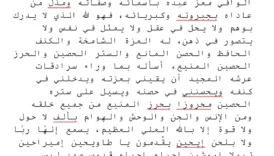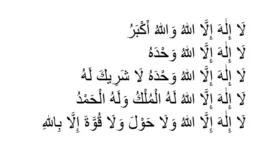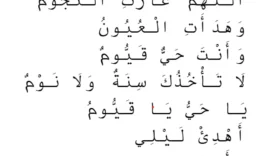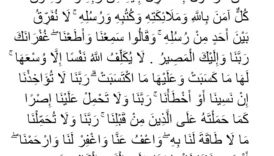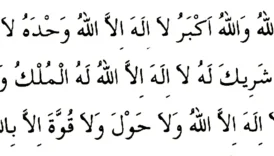The Jinn Letter and Methods of Protection
The Jinn Letter
Commonly known in certain Islamic traditions as the “Jinn Letter,” this letter is said to have been given to a companion of the Prophet—Abu Dujana (may Allah be pleased with him)—as a means of protection from jinn (unseen spiritual beings). Many believe that keeping this document at home or carrying it can prevent jinn from causing distress or harm. Some Islamic scholars hold that the letter dates back to the early period of Islam and was transmitted by the Companions (Sahabah) and their followers (Tabi’in). Although there isn’t conclusive evidence that the Prophet Muhammad (peace be upon him) himself wrote it, popular belief credits it with offering a strong spiritual safeguard.
- The Jinn Letter and Methods of Protection
- The Jinn Letter
- The Famous Narrative about How the “Jinn Letter” Came to Be
- The Story of Abu Dujana (r.a.)
- The Original Arabic Text of the “Cin Mektubu”
- Purpose and Interpretation
- The Islamic Approach to Jinn
- Methods of Protection and Recommended Verses
- 1. Ayat al-Kursi (Surah al-Baqarah 2:255)
- 2. Surah al-Fatihah (Complete)
- 3. Surah al-Ikhlas
- 4. Surah al-Falaq (Complete)
- 5. Surah an-Nas (Complete)
- Attitude and Faith Regarding the Letter
- Conclusion
- References
The Famous Narrative about How the “Jinn Letter” Came to Be
The Story of Abu Dujana (r.a.)
According to a well-known narrative, Abu Dujana (may Allah be pleased with him) once complained of being unable to sleep due to strange noises—like grinding millstones and buzzing beehives—that terrified him at night. Disturbed by these occurrences, he reported the situation to the Prophet Muhammad (peace be upon him). In response, the Prophet instructed Imam Ali (may Allah be pleased with him) to write a special prayer/letter (often referred to as the “Cin Mektubu”) and told Abu Dujana to place it under his pillow.
Abu Dujana recounts:
“I took the written letter, rolled it up, brought it home, and placed it under my pillow. That night, I went to sleep but woke up suddenly to screaming voices. They said: ‘O Abu Dujana! You’ve burned us with these words. By your master (Muhammad), please remove this from us, or there is no escape for us! We will never come back to your home, your neighbors, or anywhere this letter is found.’ I answered, ‘By Allah, I cannot remove it until I get permission from the Messenger of Allah (peace be upon him)!’”
Throughout the night, the jinn cried and pleaded, depriving Abu Dujana of sleep. The following morning, after performing the Fajr prayer with the Prophet (peace be upon him), he informed him of the incident. The Prophet is reported to have replied:
“Abu Dujana! Now you can remove that letter. By Him who sent me with the truth, they (the jinn) will feel the torment of that punishment until the Day of Judgment.”
According to this tradition, whoever keeps the text of the letter in their home or on their person will supposedly never be bothered again by jinn in or around their residence.
*(See Delâilü’n-Nübüvve and Tezkire-i Kurtubî)
The Original Arabic Text of the “Cin Mektubu”
Below is the Arabic text often referred to as the “Cin Mektubu” in contemporary usage:
Arabic Text
بِسْمِ اللهِ الرَّحْمٰنِ الرَّحِيمِ
هٰذَا كِتَابٌ مِنْ مُحَمَّدٍ رَسُولِ اللّٰهِ رَبِّ الْعَالَمِينَ
اِلَىٰ مَنْ طَرَقَ الدَّارَ مِنَ الْعَمَّارِ وَالزُّوَّارِ وَالنِّسَاءِ جِنْرِ
اَلّا طَارَ رَقاً يَطْرُقُ يَا خَبِيرُ يَا اللهُ
بَعْدَ فَاِنَّ لَنَا وَلَكُمْ فِى الْحَقِّ سَعْةٌ
فَاِنْ نَكَ عَاشِقاً هَالِكاً اَوْ مُولِعاً اَوْ فَاجِراً مُفْتَتِحاً اَوْ رَاغِباً حَقّاً اَوْ مُبْطِلاً
فَهَذَا كِتَابُ اللّٰهِ تَعَالَى يَنْطِقُ عَلَيْنَا وَعَلَيْكُمْ بِالْحَقِّ
بِاَنَّا كُنّا نَنْسَخُ مَا كُنْتُمْ تَعْمَلُونَ وَرَسَلْنَا يَكْتُبُونَ مَا تَمْكُرُونَ
اَتْرُكُوا صَاحِبَ كِتَابِي هٰذَا وَانْطَلِقُوا اِلَى عِبَدةِ الْاَصْنَامِ وَالْاَوْثَانِ
وَاِلَى مَنْ تَزْعُمُونَ اَنَّهُ مَعَ اللهِ اِلٰهٌ آخَرُ
لا اِلٰهَ اِلَّا هُوَ كُلُّ شَيْءٍ هَالِكٌ اِلَّا وَجْهَهُ
لَهُ الْحُكْمُ وَاِلَيْهِ تُرْجَعُونَ هُمْ لا يُبْصِرُونَ
جَمَعْتُمْ جَمْعَةً تَغْلِبُونَ حَمٍّ وَالْكِتَابِ الْمُبِينِ
يَعْرِفُونَ اَعْدَاءَ اللّٰهِ وَبَلَغَتِ اللّٰهِ حُجَّةٌ
اللّٰهُ وَلا حَوْلَ وَلا قُوَّةَ اِلَّا بِاللّٰهِ
يَسْتَكْبِكُمْ اللّٰهُ وَهُوَ السَّمِيعُ الْعَلِيمُ
Brief Transliteration (line by line)
Bismillâhi’r-Rahmâni’r-Rahîm
Hâzâ kitâbun min Muhammedin Rasûlillâhi Rabbi’l-âlemîn
ilâ men taraka’d-dâra mine’l-ammâri ve’z-züvvâri ve’n-nisâ’i cinner
ellâ târa rak’an yatruqu yâ Habîru yâ Allâh
ba’de fe inne lenâ ve lekum fi’l-hakki se‘atun
fe in neka ‘âşikan hâlikan ev mûli‘an ev fâciran muftetihan ev râgiban hakkan ev mubtılan
fe hâzâ kitâbullâhi Teâlâ yantıku ‘aleynâ ve ‘aleykum bil-hakk
bi ennâ kunnâ nensehu mâ kuntum ta‘melûne ve reselnâ yektubûne mâ temkurûne
etrukû sâhibe kitâbî hâzâ ve’ntalikû ilâ ibâdeti’l-asnâmi ve’l-evthân
ve ilâ men tez‘umûne ennehu ma‘allâhi ilâhun âkhar
lâ ilâhe illâ Hû, kullu şey’in hâlikun illâ vechah
lehu’l-hukmu ve ileyhi turce‘ûn, hum lâ yubsirûn
cema‘tum cem‘aten taglibûne hammin ve’l-kitâbi’l-mubîn
ya‘rifûne a‘dâallâhi ve belega t-illâhi huccetun
allâhu ve lâ havle ve lâ kuvvete illâ billâh
yestakbikumullâhu ve huve’s-semî‘u’l-‘alîm
Concise Translation
“In the name of God, the Most Compassionate, the Most Merciful.
This is a letter from Muhammad, the Messenger of God and Lord of all realms, addressing the jinn who enter these dwellings (visitors or inhabitants). Mind God’s command: if you are enamored, sinful, unjust, or rebellious, know that this letter of God’s authority speaks truth upon us and you. We record what you do, and we dispatch scribes to note your plots. Leave the bearer of this letter in peace. If you claim other deities besides God, know that there is no deity except Him. All will perish except His countenance. Rule is His, and to Him you shall return. Though some remain blind to the truth, the proof of God reaches them. All power and might are by God alone, and He is All-Hearing, All-Knowing.”
Note: While some maintain this text dates from the time of the Companions, there is no definitive evidence proving that the Prophet (peace be upon him) personally composed it. Nonetheless, events like Abu Dujana’s story contribute to the belief that this letter serves as a potent means of spiritual protection.
Purpose and Interpretation
The “Cin Mektubu” is said to have been given to Abu Dujana (r.a.) and other companions to ward off jinn, disturbing sounds, and fears. Tradition holds that anyone sleeping with the letter under their pillow, or keeping it at home, might be safeguarded from jinn’s harassment by God’s permission. The disquiet jinn experience is believed to stem from the letter’s foundation in the Quran and the teachings of the Prophet (peace be upon him), thus granting it spiritual power.
The Islamic Approach to Jinn
In Islamic belief, jinn are moral beings—like humans—responsible for their faith and actions. Some jinn are believers, while others are disbelievers or malicious. The Quran (notably Surah al-Jinn) discusses their existence and interactions with humans. The “Cin Mektubu” is commonly viewed as a practical way to control such interactions, shielding people from the potential harm of the unseen realm.
(See Tafsir al-Qurtubi, Surah al-Jinn; Ibn Kathir, Tafsîr al-Qur’ân al-Azim, commentary on Surah al-Jinn.)
Methods of Protection and Recommended Verses
Beyond the presence of the “Cin Mektubu,” Islamic scholars emphasize regularly reading Quranic chapters and verses specifically known for their protective merits. The letter itself references or aligns with these protective verses, but the primary safeguard lies in actively reciting them with the intention of seeking God’s protection.
1. Ayat al-Kursi (Surah al-Baqarah 2:255)
Arabic (Complete)
اللَّهُ لَا إِلٰهَ إِلَّا هُوَ الْحَيُّ الْقَيُّومُۚ
لَا تَأْخُذُهُ سِنَةٌ وَلَا نَوْمٌۚ
لَهُ مَا فِي السَّمٰوَاتِ وَمَا فِي الْأَرْضِۗ
مَنْ ذَا الَّذِي يَشْفَعُ عِنْدَهُ إِلَّا بِاِذْنِهٖۚ
يَعْلَمُ مَا بَيْنَ اَيْدِيهِمْ وَمَا خَلْفَهُمْۚ
وَلَا يُحِيطُونَ بِشَيْءٍ مِنْ عِلْمِهٖۤ إِلَّا بِمَا شَاءَۚ
وَسِعَ كُرْسِيُّهُ السَّمٰوَاتِ وَالْأَرْضَۚ
وَلَا يَئُودُهُ حِفْظُهُمَاۚ
وَهُوَ الْعَلِيُّ الْعَظِيمُ
Transliteration
“Allāhu lā ilāha illā Huwa al-Ḥayyul-Qayyūm.
Lā ta’khudhuhū sinatun wa lā nawm.
Lahū mā fī as-samāwāti wa mā fī al-arḍ.
Man dhā alladhī yashfa’u ‘indahū illā bi-idhnih.
Ya’lamu mā bayna aydīhim wa mā khalfahum.
Wa lā yuḥīṭūna bi-shay’in min ‘ilmihī illā bimā shā’a.
Wasi’a kursiyyuhū as-samāwāti wa al-arḍ.
Wa lā ya’ūduhū ḥifẓuhumā.
Wa Huwa al-‘Aliyyu al-‘Aẓīm.”
Brief Meaning
“Allah—there is no deity except Him, the Ever-Living, the Sustainer. Neither drowsiness nor sleep overtakes Him. To Him belongs whatever is in the heavens and whatever is on the earth. Who can intercede before Him except by His permission? He knows what lies before them and what lies behind them, and they cannot grasp any of His knowledge except what He wills. His Throne (Kursi) extends over the heavens and the earth. Preserving them does not tire Him. He is the Most High, the Magnificent.”
(See Ibn Kathir, Tafsîr on Al-Baqarah 2:255)
2. Surah al-Fatihah (Complete)
Arabic
بِسْمِ اللَّهِ الرَّحْمٰنِ الرَّحِيمِ
الْحَمْدُ لِلَّهِ رَبِّ الْعَالَمِينَ
الرَّحْمٰنِ الرَّحِيمِ
مٰلِكِ يَوْمِ الدِّينِ
إِيَّاكَ نَعْبُدُ وَإِيَّاكَ نَسْتَعِينُ
اهْدِنَا الصِّرَاطَ الْمُسْتَقِيمَ
صِرَاطَ الَّذِينَ أَنْعَمْتَ عَلَيْهِمْ
غَيْرِ الْمَغْضُوبِ عَلَيْهِمْ وَلَا الضَّالِّينَ
Transliteration
- Bismillāhir-Raḥmānir-Raḥīm
- Al-ḥamdu lillāhi Rabbi’l-ʿālamīn
- Ar-Raḥmānir-Raḥīm
- Māliki yawmid-dīn
- Iyyāka naʿbudu wa iyyāka nastaʿīn
- Ihdināṣ-ṣirāṭal-mustaqīm
- Ṣirāṭallaḏīna anʿamta ʿalayhim, ġayril-maġḍūbi ʿalayhim walāḍ-ḍāllīn
Brief Meaning
- In the Name of Allah, the Most Compassionate, the Most Merciful.
- All praise is due to Allah, Lord of all realms.
- The Most Compassionate, the Most Merciful.
- Master of the Day of Judgment.
- You [alone] we worship and You [alone] we ask for help.
- Guide us to the straight path—
- The path of those upon whom You have bestowed favor, not of those who have evoked [Your] anger or of those who are astray.
(See Tafsir al-Qurtubi, Surah al-Fatihah)
3. Surah al-Ikhlas
Arabic
قُلْ هُوَ اللَّهُ أَحَدٌ
اللَّهُ الصَّمَدُ
لَمْ يَلِدْ وَلَمْ يُولَدْ
وَلَمْ يَكُنْ لَهُ كُفُوًا أَحَدٌ
Transliteration
“Qul huwallāhu aḥad
Allāhuṣ-ṣamad
Lam yalid wa lam yūlad
Wa lam yakun lahu kufuwan aḥad”
Brief Meaning
“Say: He is Allah, the One and Only. Allah, the Self-Sufficient (eternally besought by all). He neither begets nor is born. And there is none comparable to Him.”
(See Tafsir al-Tabari, Surah al-Ikhlas)
4. Surah al-Falaq (Complete)
Arabic
قُلْ أَعُوذُ بِرَبِّ الْفَلَقِ
مِنْ شَرِّ مَا خَلَقَ
وَمِنْ شَرِّ غَاسِقٍ إِذَا وَقَبَ
وَمِنْ شَرِّ النَّفَّاثَاتِ فِي الْعُقَدِ
وَمِنْ شَرِّ حَاسِدٍ إِذَا حَسَدَ
Transliteration
- Qul aʿūdhu birabbi’l-falaq
- Min sharri mā khalaq
- Wa min sharri ghāsiqin idhā waqab
- Wa min sharri’n-naffāthāti fīl-ʿuqad
- Wa min sharri ḥāsidin idhā ḥasad
Brief Meaning
- Say: “I seek refuge in the Lord of daybreak,
- From the evil of what He created,
- And from the evil of darkness when it settles,
- And from the evil of those who blow on knots (sorcerers),
- And from the evil of an envier when he envies.”
(See Sahih Muslim, section on Remembrances and Supplications)
5. Surah an-Nas (Complete)
Arabic
قُلْ أَعُوذُ بِرَبِّ النَّاسِ
مَلِكِ النَّاسِ
إِلٰهِ النَّاسِ
مِنْ شَرِّ الْوَسْوَاسِ الْخَنَّاسِ
الَّذِي يُوَسْوِسُ فِي صُدُورِ النَّاسِ
مِنَ الْجِنَّةِ وَالنَّاسِ
Transliteration
- Qul aʿūdhu birabbi’n-nās
- Maliki’n-nās
- Ilāhi’n-nās
- Min sharri’l-waswāsi’l-khannās
- Allaḏī yuwaswisu fī ṣudūri’n-nās
- Mina’l-jinnati wa’n-nās
Brief Meaning
- Say: “I seek refuge in the Lord of mankind,
- The King of mankind,
- The God of mankind,
- From the evil of the lurking whisperer,
- Who whispers [evil] into the breasts of mankind,
- From among jinn and men.”
(See Ibn Majah, Book of Supplications)
Attitude and Faith Regarding the Letter
Abu Dujana’s (r.a.) account illustrates that placing the “Cin Mektubu” under one’s pillow or keeping it at home primarily symbolizes seeking refuge in Quranic guidance. Although many believe in its role as a spiritual shield, it remains crucial to remember that true protection comes only by the will and power of Allah. Rather than succumbing to fear, believers are encouraged to enhance their worship and supplications, ensuring they align themselves with the Divine.
(See Imam al-Ghazali, Ihya Ulum ad-Din; Sahih al-Bukhari, “Tawheed”)
Conclusion
- According to Abu Dujana’s (r.a.) account, this letter was effectively used to ward off harassing jinn; the Prophet (peace be upon him) reportedly stated that the jinn would endure ongoing torment because of it.
- While there are differing perspectives on how and when the “Cin Mektubu” emerged, sources like Delâilü’n-Nübüvve and Tezkire-i Kurtubî mention the story as a primary factor in spreading awareness of this letter among the public.
- Its essence rests on Quranic protection and adhering to the Prophet’s (peace be upon him) Sunnah. Many Muslims treat it as a supplementary spiritual safeguard, though the ultimate trust is in God alone.
In the end, power and might belong solely to Allah. Any document or supplication is merely a tool prompting believers to turn toward Him. When one places their complete trust in the Almighty, neither seen nor unseen forces can cause enduring harm.
References
- Delâilü’n-Nübüvve
- Tezkire-i Kurtubî
- Tafsîr at-Tabarî – Imam at-Tabarî
- Ibn Kathir, Tafsîr al-Qur’ân al-Azim – Ibn Kathir
- Tafsîr al-Qurtubi – Imam al-Qurtubi
- Sahih al-Bukhari – Imam al-Bukhari
- Sahih Muslim – Imam Muslim
- Ibn Majah, Book of Supplications – Ibn Majah
- Imam al-Ghazali, Ihya Ulum ad-Din – Imam al-Ghazali
- Ibn Kathir, al-Bidayah wan-Nihayah – Ibn Kathir
